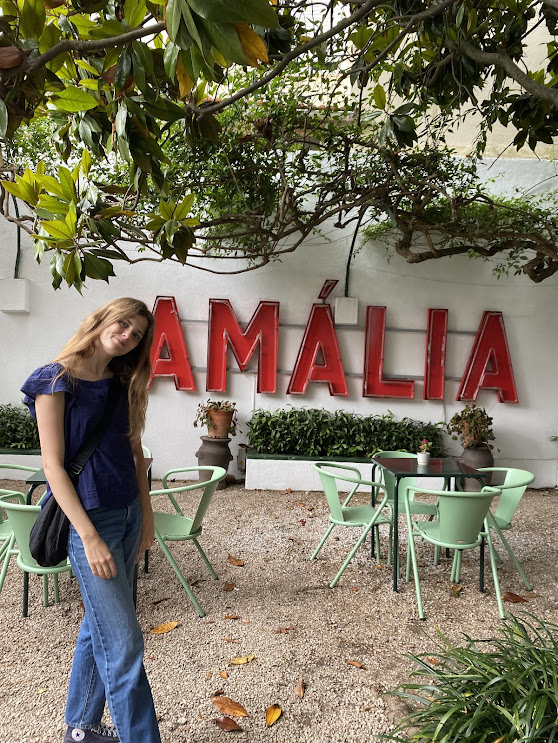Amalia Rodrigues
I have loved learning about Amalia Rodrigues and visiting her house was a super cool experience! I’m gonna be honest, at first, I thought it was going to be boring and very empty like a museum but I loved it! We got to see how her house actually looked when she lived there and all of her personal belongings were still there! I have learned that Amalia really revolutionized Fado music and that basically anyone who knows Fado music has heard of Amalia Rodrigues. Her poems and the way she sang with so much emotion helped a lot of people to learn to really appreciate the music more and fall in love with Fado.
Her contribution is important because she made many changes to the traditions of Fado that made it more interesting and personal to her. It was her that started to wear the black shawl while she sang Fado and from what I saw at our Fado dinner, many Fado singers continue to wear the black shawl just like her. She also toured all over the world and performed her music which probably helped to popularize Fado in places other than just Portugal. She has been honored with medals and trophies from many important people which I feel like was unheard of at the time for a woman.
I think that she has definitely been commemorated well. Her house is such a cool place to visit and I’m so glad that she chose to have her house preserved like that so we could come and see it. And the fact that they still keep her bird at the house shows that they really care about her and her legacy. I also think it is amazing that one of the highest parts of Lisbon has a park named after her that overlooks part of the city. It is beautiful and is a place that I would expect to be named after some type of king or ruler so it's cool that it is named after a woman who is an artist!



Love this! I think that because she was so key in helping people love fado, she really deepens our cultural understanding of Portugal. She also was an icon and brought her culture to many international places like you said! The people of Portugal love her and so the more we learn about her, we are also learning about them at the same time.
ReplyDeleteLove this!! I think it is abundantly clear that Amalia Rodriguez experienced success pretty early on in her life, but I also think it is important to notice that she faced obstacles as well. She grew up extremely poor, so when she realized that she was going to make it in the Fado world, her mother wanted to make sure she was married off before she began her career. This is so crazy to me because, as a woman, it was radical to go and try to make a career for yourself before you were wed to a man. Luckily, this kind of behavior has died down in todays world, but it is still not completely gone. People still think it is weird if you tell them you are pursuing a career and not actively pursuing a marriage!! This is something I believe still needs to change drastically in the U.S. Once again, great post Betsy!
ReplyDeleteFado is something that is well known in Portugal and many people go to portugal to experience Fado. It is a massive part of the culture, and Amalia Rodriguez is a big part of why it is so popular in Portugal! She continues to inspire generations with Fado and other Fado singers, continuing the traditions of the cultural capital.
ReplyDeleteYour writing on Amalia Rodriguez is really engaging, and I loved what you had to say about her iconic black shawls! Amalia Rodriguez did so much songwriting and performing during her lifetime, and her contributions were greatly appreciated by the people of her time and by the current Portuguese folk. Her lasting impact through her creativity and passion, as described in your blog, deepened my understanding of just how much she influenced the city of Lisbon as a cultural capital.
ReplyDelete